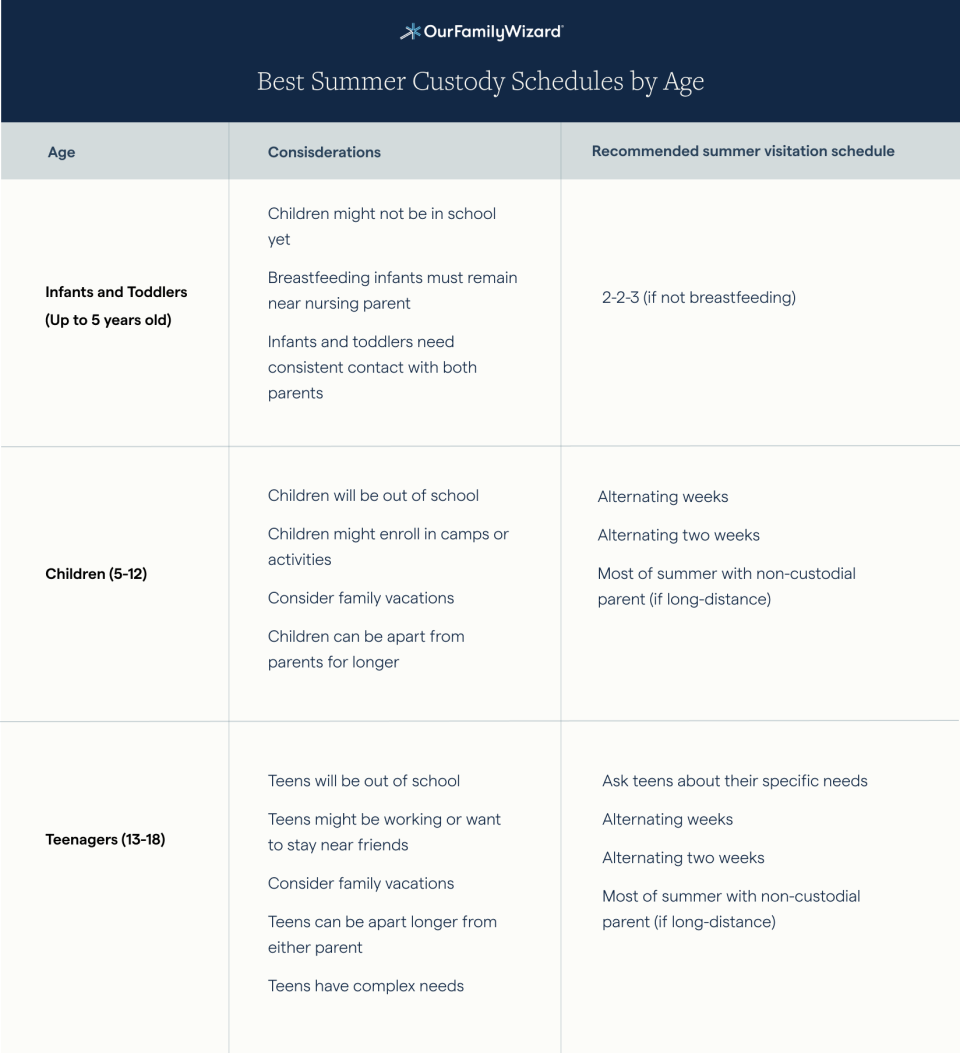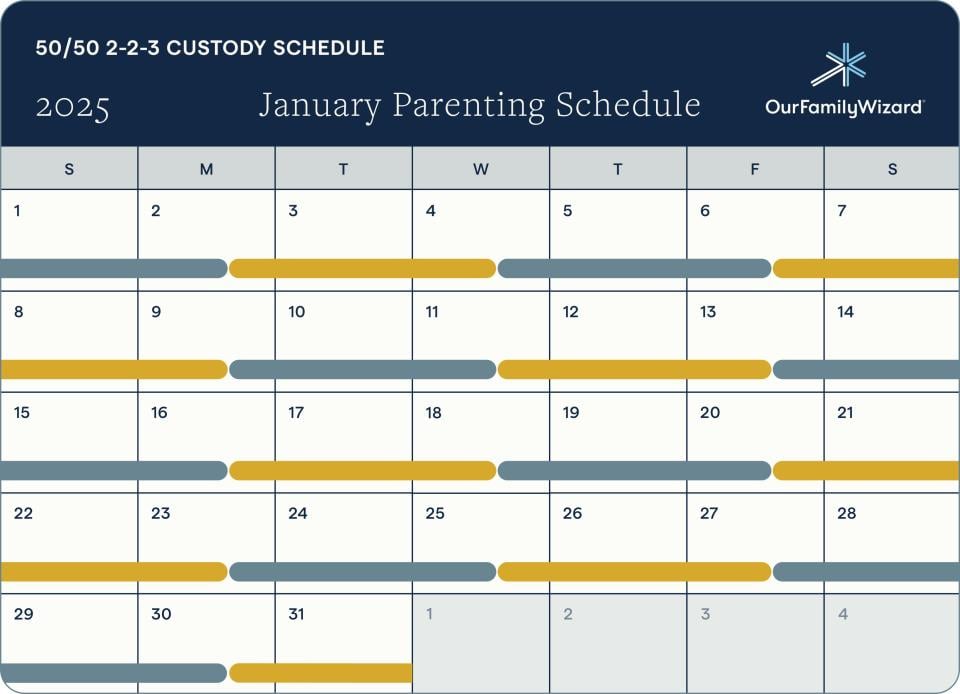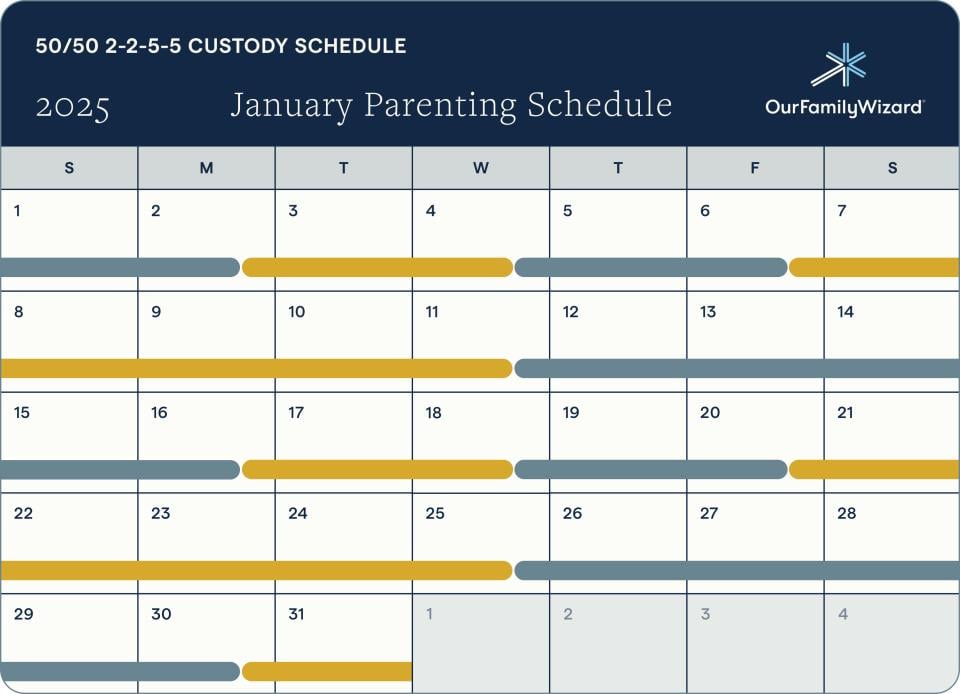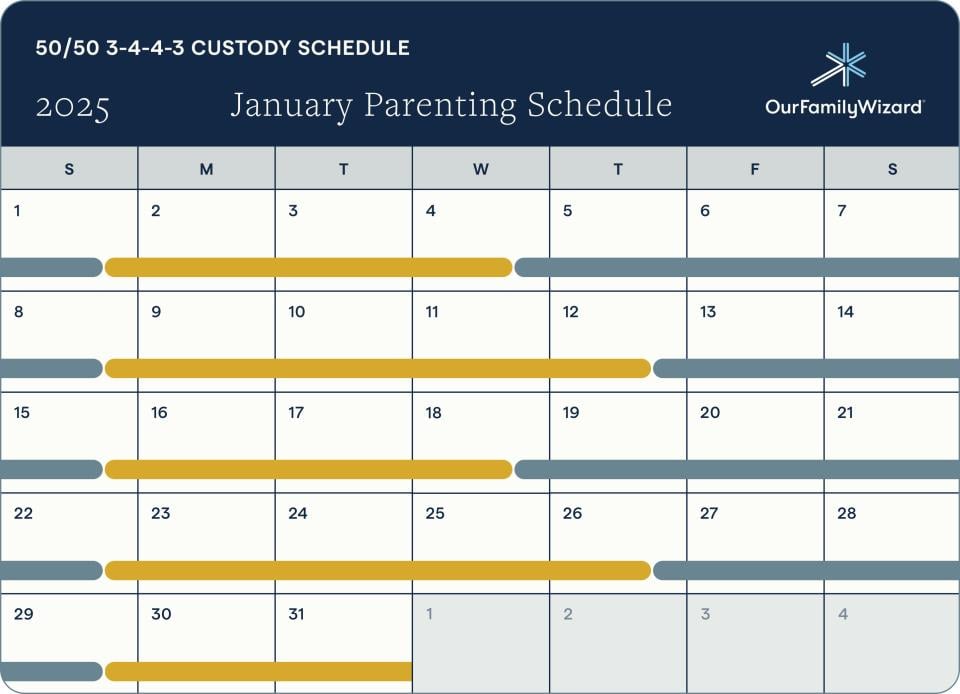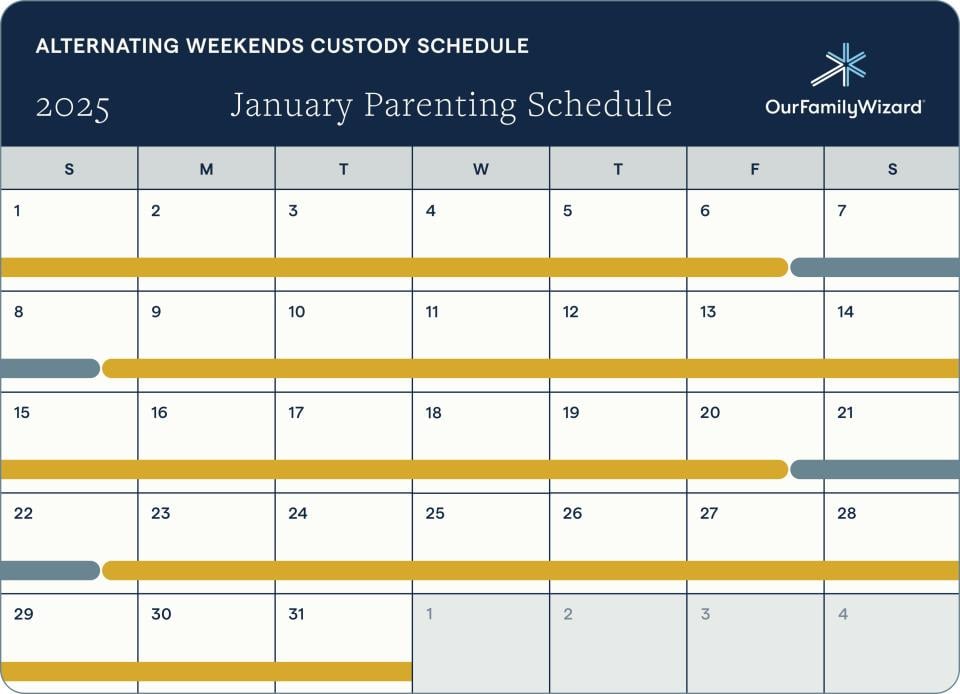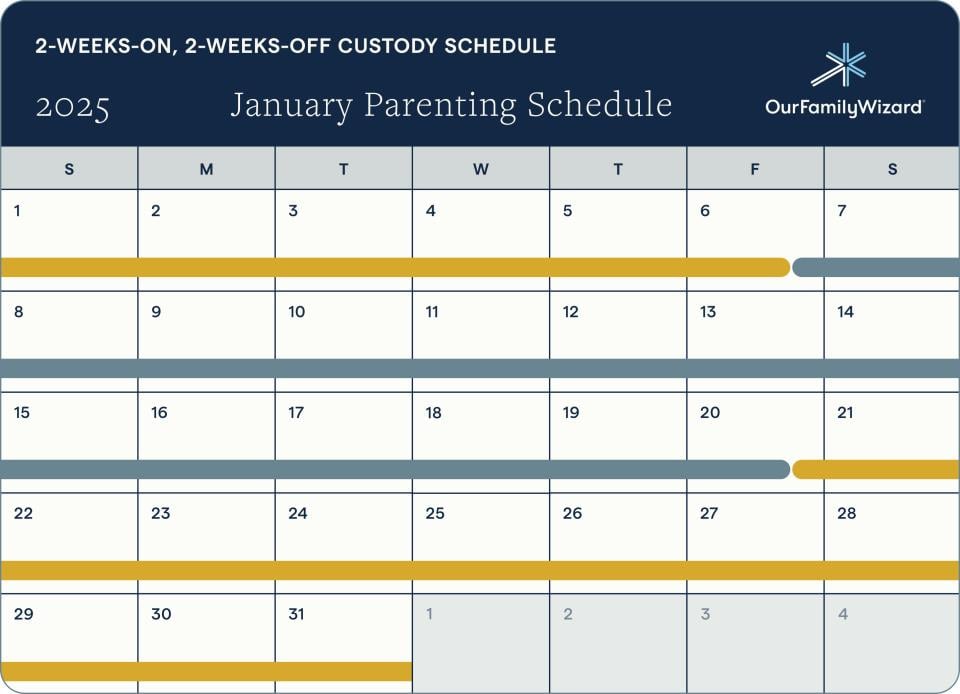Summer Visitation Schedules: Options, Factors, & Expert Tips
Summer can be exciting for families, but visitation changes can be stressful. Plan for summer effectively with this comprehensive article. Explore all the summer visitation schedule options and gain insights from family law experts to find your ideal schedule.
Inside this article
- Summer custody visitation schedule examples
- Best summer visitation schedule by age
- Factors to consider when planning summer parenting plans
- Expert tips on how to manage a summer visitation schedule
- Create your personalized summer custody schedule template
- The most effective way to manage and track summer visitation schedules
How does summer visitation work?
Summer visitation outlines how co-parents distribute parenting time when the child is out of school. Many co-parents change their parenting schedule over the summer to accommodate the change in routine. The best summer visitation schedule depends on your specific circumstances.
The start of summer break brings significant changes for school-aged children and their parents. Without the structure of an academic school year, children have far more free time. For co-parents with shared custody, adapting to the summer can be challenging. In fact, it often requires a new parenting time arrangement that allows for activities like summer camps or family vacations that don't fit into the regular school year routine.
custody, adapting to the summer can be challenging. In fact, it often requires a new parenting time arrangement that allows for activities like summer camps or family vacations that don't fit into the regular school year routine.
"During summer, school-aged children don't have the academic calendar to guide their routine," explains Kristina Jarvis, a family law attorney licensed in Illinois since 2000 and South Carolina since 2020. “Without school, summer takes on a rhythm of its own. Children might participate in camps or extracurricular activities. Plus, co-parents usually want to take advantage of this time to spend vacations with them. It's crucial for co-parents to recognize summer as a distinct period and ensure their parenting schedules can accommodate the changes the season brings.”
Co-parents typically come to an agreement about summer visitation when they're building their parenting plan. Some co-parents maintain the normal school-year schedule, while others make significant changes. The best parenting option depends on your specific situation. 
Ketan Soni, a board-certified family law specialist in North Carolina, emphasizes that, like most things related to parenting, how you handle summer depends on your circumstances.
"Whether or not you change the schedule in summer depends on a lot of variables that change with each family," he says. "The normal schedule, the age of the children, and your co-parenting dynamic will come into play. Overall, the goal is to put the children first and ensure both co-parents have the opportunity to create memorable summer memories, like taking vacations or sending their kids to camp.”
Whether you choose to keep or change the schedule, experts agree it's best to consider summer early instead of letting it sneak up on you.
"We all want our clients to approach summer proactively,” Jarvis says. "When creating the parenting plan, outline summer in a forward-thinking way that changes with the age of your children. Then, once the new year rolls around, be sure you have an idea of how you're going to spend the summer, whether that's on vacation or enrolling your child in camps. Planning ahead of time will save everyone stress and set your child up to have a great summer.”
Soni adds, "Remember, summer should be fun for your child. As with all things co-parenting, it’s always best to approach summer visitation with the goal of creating the best outcome for your child.”
Key takeaways:
- Summer parenting schedules need to accommodate the season’s unique structure and activities, like summer camps and vacations.
- The ideal summer schedule changes with your child’s age and prioritizes their developmental needs.
- Many experts recommend the alternating-week schedule for the summer for co-parents who live near one another.
- In long-distance co-parenting, it’s typical for the noncustodial co-parent to receive a large portion or even the majority of the summer.
- Using a co-parenting app and calendar is the best way to manage summer schedules and communicate changes to your co-parent.
Summer visitation schedule examples
Summer visitation schedules delineate where the child will be during the summer. Some co-parents keep their normal schedules and add vacation time for both parents. Others switch to a different schedule, like alternating weeks or months, especially when there’s a long-distance parent.
"Your summer schedule might vary from your regular school-year routine, or it may stay the same," explains Jarvis. "The extent of change in your schedule depends on a variety of specific factors. For instance, some parents who share custody equally often keep their schedule consistent throughout the year; others with more frequent parenting time exchanges, such as a 2-2-3 custody schedule, may decide on a schedule with fewer exchanges, such as a week-on, week-off schedule. In long-distance co-parenting situations, it's common for the noncustodial parent to have the child for a larger portion of the summer. With endless possibilities, the ideal schedule depends on your individual circumstances."
Here are common ways that co-parents approach summer visitation:
- Maintain the normal schedule and add a vacation option
Your normal schedule may already suit your needs. A common approach involves sticking to the same routine while granting each co-parent a two-week uninterrupted vacation. In this approach, both co-parents enjoy 10 to 14 days of consecutive parenting time during the summer. Your parenting plan should stipulate who gets priority on dates and when they need to notify the other co-parent.
This option is particularly appealing to co-parents who already follow a 50/50 arrangement during the school year and meet conditions that make 50/50 doable, like living close to one another. One significant benefit is that sticking to the normal routine eliminates the need for summer adjustments, providing a reliable, routine schedule. Plus, with the vacation options, both co-parents know they’ll still enjoy one-on-one parenting time with their child.
Sometimes, sticking to the same routine can be challenging if your child is involved in summer camps with a unique schedule that the normal routine can’t accommodate.
Soni notes: "Managing a new routine under the constraints of a schedule designed for the school year might not work, though it very well could. It all depends on how far apart you live, the co-parenting dynamic, the camp schedule, and more." - Switch from a 50/50 schedule with frequent exchanges to a schedule with less frequent exchanges
For co-parents with a 50/50 custody or 60/40 custody arrangement, the summer offers a chance to maintain the same overall parenting time, but with a twist: The schedule can involve less frequent exchanges. With the absence of school schedules, it might be simpler or more appealing for children to stay at one parent's house for longer, because it tends to be less logistically demanding. This slight adjustment for the summer can bring a welcome change for many families.
Jarvis shares insights from experience: "I've seen clients transition from a standard 50/50 split, like a 2-2-3 pattern, to arrangements with fewer exchange days, like the week-on, week-off schedule. The idea is to allow for more relaxation and give the child a chance to settle in at each home for an extended time. This shift can provide a pleasant respite from the busier rhythms of the school year." - Give one parent most of the summer
In certain cases, co-parents might agree to let the noncustodial co-parent have much of the summer, especially in long-distance co-parenting situations. This could mean the noncustodial co-parent taking almost the entire summer, aside from the first and last weeks, or dividing it differently to provide six to eight uninterrupted weeks. The objective is to allocate a substantial portion of the summer to the noncustodial co-parent while still allowing the custodial parent their vacation time and giving the child a chance to readjust to their primary home before school recommences.
Jarvis shares this insight: "In cases where one co-parent is long-distance, they might only see their child for a weekend every few months. To make up for the loss of parenting time, it’s common for co-parents to agree that the long-distance co-parent should have more parenting time in the summer. In this arrangement, the noncustodial co-parent has the children for the entire summer, except for the week after school ends and the week before it begins. Another arrangement is for the noncustodial co-parent to have the first two months of summer, with the other co-parent taking the last month. This arrangement helps the child acclimate back to their regular routine before school starts."
Soni adds, "Long-distance co-parenting is relatively rare, but when it does occur, summer presents a great opportunity for the long-distance co-parent to have extended time with their child."
If the co-parents reach an agreement, courts usually won't intervene. However, most states have guidelines or standard orders that allocate a certain number of consecutive weeks for noncustodial parents during the summer. These guidelines come into play when parents can't agree on a schedule or as a default in custody agreements, but specifics can vary greatly from state to state.
These types of schedules benefit the noncustodial parent by allowing more time with the child, and the child gets to spend quality time with them. The downside is that the custodial parent may go an extended period without seeing the child. However, some custodial parents may welcome this break, understanding that they still have their vacation time to spend with the child outside of the school year.

Below, we’ll list some of the most common parenting schedules used during the school year. Considering these can help you visualize potential changes for the summer. Additionally, apart from these regular schedules, each co-parent typically has a week or two of uninterrupted parenting time for vacation in the summer. Remember, you can adapt these schedules for summer. We’ll also outline the summer-specific pros and cons.
50/50 visitation splits:
2-2-3 visitation schedule
The 2-2-3 custody schedule is a 50/50 split where the children go to one co-parent’s house for two days, then the other has them for the next two days, and then the first co-parent has them for three days (often a long weekend). The pattern reverses in the second week.
Pros: This arrangement ensures an equal sharing of time over two weeks, which can be particularly beneficial for younger children who find longer separations challenging.
Cons: The downside is the high frequency of transitions, which might be more complicated in the summer without the regularity of school drop-offs and pickups. It also might be difficult to track the exchanges and coordinate summer activities, especially because each parent’s specific days change every week.
Best for: Families living near each other and co-parents hoping to maintain a high level of involvement through the summer, particularly with younger school-aged children.
2-2-5-5 visitation schedule
In the 2-2-5-5 custody schedule, one co-parent has the child for two days, and then the other has them for the next two days. Then, the co-parents switch to five-day blocks.
Pros: This schedule strikes a balance between maintaining frequent contact and reducing the number of transitions, offering a rhythm that can be more relaxing for both children and parents.
Cons: Co-parents may struggle to plan summer activities around this schedule. For some parents or children, five nights might feel too long to be apart.
Best For: Families who use the 2-2-3 schedule but want a summer variation that allows for longer, uninterrupted periods with the children.
3-4-4-3 visitation schedule
Under a 3-4-4-3 custody schedule, co-parents alternate between three- and four-day periods with their children.
Pros: This schedule balances exchanges with time. It requires only two weekly exchanges, and the children don’t spend an extended period away from either co-parent.
Cons: It may require more planning to keep track of the alternating days, which could be a bit more complex for scheduling summer activities.
Best For: Families who value equal parenting time but prefer a schedule that reduces the number of exchanges compared with a schedule like 2-2-3.
Week-on, Week-off (Alternating Weeks) visitation schedule
Under the week-on, week-off custody schedule, each co-parent has the child for a full week at a time.
Pros: This straightforward schedule provides a balanced approach with fewer transitions, allowing for more stable and predictable summer planning.
Cons: Like the two-week alternating schedule outlined below, the week-on, week-off pattern might be challenging for children who struggle with longer separations from either parent.
Best For: Families seeking a simple, balanced schedule and for children who adapt well to week-long stays.
Alternating every two weeks visitation schedule
In this schedule, each co-parent has the child continuously for two weeks.
Pros: This schedule simplifies logistics significantly and allows both parents and children to enjoy extended time together without the interruption of frequent exchanges.
Cons: The main drawback is the longer interval between visits, which might be difficult for younger children or those who need regular contact with both co-parents.
Best For: Families where children are comfortable with longer intervals between visits and for parents who have vacation plans that align with their custody weeks.
The whole summer at one parent’s home
In some scenarios, one parent has primary parenting responsibility throughout the school year, and the other parent lives out of state or simply far away. Weekend or midweek visits are tough to arrange. If that’s your situation, then it might make sense for your child to spend the summer with the out-of-the-area parent.
This summer co-parenting schedule allows that co-parent to enjoy the kids all summer long, and it makes sure the children are building strong bonds with both parents every year.
Whatever pattern you choose, simply having a clearly defined plan for sharing parenting time will help your child feel secure, knowing they can rely on a consistent schedule.
Here are some other schedules:
- Every weekend visitation schedule:
In the every-weekend custody schedule, the children spend the week with the custodial co-parent and the weekends with the other.
Pros: This schedule allows the children to attend uninterrupted weekday summer camps while spending time with one parent. It provides the other parent a consistent opportunity to spend weekends together. It could work well when the noncustodial parent doesn’t normally get weekends in the summer.
Cons: One co-parent misses out on the unique weekday experiences of summer, like impromptu outings or relaxed routines. That could lead to a feeling of imbalance, where one parent handles most routine summer responsibilities while the other is perceived as the “fun weekend parent.”
Best for: When one co-parent has a demanding weekday schedule in the summer but can fully engage with their children on weekends. For example, if one co-parent works seasonally in the summer, this schedule could allow for an ideal balance of work and family time. - Alternating weekend visitation schedule
In an alternating-weekend custody schedule, the child lives with the custodial parent during the week and visits the noncustodial parent every other weekend.
Pros: An alternating-weekend schedule gives children a stable routine during the week, making it easier for them to participate in continuing summer activities like sports leagues or camps. It also ensures that both co-parents can plan special weekend getaways or spend time on the weekend with the child.
Cons: The parent without the children on weekends may miss out on classic summer weekend experiences like beach trips or barbecues. That might create a sense of disjointedness in summer planning, with each parent possibly having different approaches to weekend activities. Also, the parent who has the child only on weekends misses out on the weekday routines and activities.
Best for: Families who prioritize a consistent and stable routine during the summer weekdays while allowing both parents to enjoy meaningful and fun weekend time with their children.

Best summer custody schedules by age
The best summer schedule depends on your child’s age. For infants, stick to a single routine throughout the year. Younger school-aged children can handle alternating weeks or even months. Teenagers have complex needs, so it’s best to talk with them about their ideal schedule.
What’s best for your child changes as they grow. Here’s a summary of the best summer custody schedules by age. This list assumes that the co-parents live close enough and are splitting the summer instead of giving the noncustodial co-parent the entire summer.
- Infants & Toddlers summer visitation schedules (Up to 4 or 5 years old)
“Changing your normal schedule for infants and toddlers really doesn’t make sense,” says Soni. “Very young children thrive on stability and predictability, and suddenly changing the schedule might be stressful for them. Plus, they’re too young to attend summer camps. You don’t need to worry about coordinating these new activities into the schedule.”
When it comes to infants or children younger than 18 months old, co-parents must prioritize the child’s health above all else. For example, if a child is breastfeeding, it should be considered whether the child should stay with the nursing co-parent. Some state laws that guarantee the noncustodial co-parent a certain amount of overnight visits have exceptions for children under 18 months. - Young school-age summer visitation schedules (5 to 13 years old)
When your child is old enough to attend school regularly, their schedule will revolve around the academic calendar. But their routine will change when school is out for the summer. This period can be particularly challenging for co-parents, who now must navigate through a new schedule that balances work commitments with the children's summer activities.
Soni offers a pragmatic approach. “I recommend the alternating-weeks schedule during the summer, especially for school-aged children who can manage a week without seeing either co-parent.”
He also highlights the practicality of this arrangement: “It’s straightforward to track and creates a stable routine for everyone. It also makes vacation planning more manageable. You can align your holiday plans with the weeks you have the child. This method is financially and logistically straightforward, especially if the co-parents live relatively close to each other.”
Jarvis adds: “Co-parents who have a frequent exchange schedule during the school year, like 2-2-3, might find switching to alternating weeks advantageous.” This change offers “more uninterrupted parenting time and is easier to track and manage.” - Teenager summer visitation schedules (13 and up)
Teens usually have their own ideas for what they want to do over the summer, whether that’s to socialize or get a job. When considering a summer schedule for teenagers, experts emphasize that balancing the teen’s growing independence with each co-parent’s right to quality time with them is important.
“It’s incredibly important to get your teen’s input on what they want to do during the summer,” stresses Soni. “They might want to take a job, hang out with friends, or avoid frequent exchanges. In cases of long-distance parenting, they may not want to leave town for an extended period. On the other hand, some teenagers might welcome a change from their usual routine. The key is to recognize that teens seek a degree of independence. You can either enforce your legally granted parenting time or collaborate with them to find solutions that respect their needs and experiences.”
Alternating weeks can be effective for teenagers, especially if the co-parents live close by, as it accommodates their social activities, potential jobs, and summer school commitments. If co-parents live far apart, discussing with the teen whether they want to spend an extended period away is essential. Alternating every two weeks might also be a viable option.
“In long-distance co-parenting situations, getting the teenager's input before deciding on a long summer stay is crucial,” Soni adds. “You can visit your teen or let them invite a friend if they're going to another state for a while. There are ways to make the idea of leaving their home more appealing.”
Factors to consider when determining summer custody schedules
When planning summer custody, key factors include the child’s age and whether their routine will change in the summer. Then, consider if the co-parents’ work schedules change. Also, consider incorporating activities like summer camp or extended travel.
Jarvis, Soni, and other experts recommend co-parents consider key questions when deciding on a summer custody schedule. Review this list to help determine which schedule can fulfill everyone’s needs, especially the child’s.
- Does the child’s schedule significantly change in the summer?
Assess whether the children have different activities during the summer, like summer camps, summer sports, or a summer job, which might require them to have a more adaptable custody schedule. - Does either co-parent’s work schedule change?
Determine if seasonal changes in either co-parent's work commitments could affect their availability over the summer. For example, one parent might be a teacher and have summer off. Conversely, another might work a seasonal job with difficult summer hours. Understanding these changing work schedules will help you create a realistic plan for the summer that takes advantage of differences in work commitments. - How old is the child?
The child’s age is critical in deciding the custody schedule, as different ages have different developmental needs and preferences. - Do you have time to spend with your child?
Reflect on whether you have sufficient time to spend with your child during the summer.
"Unfortunately, it's quite common for co-parents to focus more on the quantity of days they have with their children rather than the quality of those days," Jarvis observes. She emphasizes the importance of prioritizing the child’s experience.
“If you're aiming for an equal split during the summer, it's important to think about what your children will be doing when they're with you. It's not ideal for them to be at your home only to find themselves alone while you work. If your schedule doesn't allow you to be present often, consider engaging them in meaningful activities, such as summer camps. The real goal should be to ensure the child has a fulfilling experience, rather than fixating on securing a certain number of days." - Is your child going to enroll in summer camps?
If you enroll your children in a camp or another activity, check the schedule. It might require a stable or location-specific custody schedule to support the commitments. Some summer camps might last the entire summer, with the child away from home. - Are other children in the home?
Some co-parents might have formed a separate relationship with a partner who also has children. Consider how a change in summer custody could affect everyone involved. - What does your teenager want?
“Teenagers can be tricky,” Soni says. “Some might not want to leave their friends, and other, more angsty teens, might welcome some time away. The only way to know, and involve them in their own summer, is to patiently talk with them about what they want.” - What about unique considerations?
“There are many unique 'one-off' considerations specific to each family situation,” explains Soni.
“For instance, some co-parents might have family living abroad and need to plan extended visits for the children, ensuring the trip is worthwhile. Others may want to send their child to an all-summer camp they attended as a child. There are also cases where co-parents have work situations with special requirements during the summer. It's crucial to consider all possible scenarios that might arise in the summer and discuss how to address them to meet everyone's needs effectively.”
Summer visitation templates
Navigating the summer schedule options can feel overwhelming. Our free summer visitation template simplifies this process by offering a comprehensive overview of all the schedules. Overlay your own important events to compare and customize each schedule to find the best fit for your family.
Expert tips for summer custody schedules
Experts recommend that co-parents approach summer custody like any other important co-parenting decision. Try to be proactive and flexible when planning and managing summer schedules. Another tip is to help children adjust to any significant schedule change.
These summer planning tips from experts apply to noncustodial and custodial parents alike.
- Be flexible
"Circumstances can change quickly, especially in the summer," Jarvis notes. "Try to be open to adjusting the schedule as needed, especially when an unexpected opportunity for the child comes up, like a chance to travel and meet a family member. Being flexible and adaptable, especially if the change benefits your child, will benefit you in many co-parenting situations." - Maintain clear and respectful communication
Documenting the specifics of your agreement helps avoid misunderstandings.
As Jarvis explains, "A parenting plan is a contract. In any contract, the details matter. Lean on your legal help and trust them if they push you to include caveats on things you think aren't important in the moment—like how you’ll handle paying for summer camps, even if your child is just a toddler now. You’ll be thankful you considered these details when you and the co-parent originally made the parenting plan." - Be proactive
When it comes to typical summer activities, you must sign up much earlier than expected.
“Some of these camps open registration in January, and they fill up quickly,” says Soni. “Be proactive and do your research ahead of time on different opportunities in your area that will work with the summer schedule. Then, as a family, you can all choose an activity that the child will be excited about. But, if you wait too long, you’ll have far fewer options.”
Soni adds, “There’s also the cost structure to consider. Who will pay for what share of summer camps and activities? Which parent will pick up and drop off the children? These are the types of considerations that can be very stressful if you’re trying to plan it at the last minute or even deal with it after the fact.” - Help the children prepare
Help your children prepare for the changing summer schedule, especially if it's significantly different from their routine. This might involve discussing the plans with them, addressing their concerns, and helping them pack if they are traveling between homes. - Use a co-parenting calendar to map your schedules
“One of the best ways to avoid scheduling confusion, in the summer and in the school year, is to use a shared calendar and map out the entire schedule a year in advance,” recommends Soni. “Then, you and your co-parent can look at the proposed changes in the summer and discuss them. This practice will reduce the stress that can already exist around planning your holidays.”
Why it’s important to consider a different custody schedule for summer
It’s important to consider the summer separately from the school year because of the season’s unique characteristics. This approach ensures that you accommodate summer activities like camps and vacations. It will help you create the most effective parenting plan for co-parents and children.
Experts agree that summer break comes with a change in routine and expectations and a different vibe. Trying to make the school-year schedule fit a new time won’t work for many families.
“Adapting the custody schedule for summer is not just about logistical convenience; it's about fostering an environment where children can experience the full joy and freedom this season offers,” Soni says.
“It’s a time for them to create memories, explore new interests, and enjoy a well-deserved break from the academic year. For co-parents, it’s an opportunity to connect with their children in a more relaxed setting and share in these precious moments. By considering a flexible and thoughtful custody arrangement for the summer, co-parents can ensure that this season remains a special and cherished time for their children, free from the stress of rigid schedules and missed opportunities.”
Jarvis agrees. “There’s just more time for everyone in the summer. Co-parents will want, first and foremost, to have some uninterrupted vacation time with their children. Children will want to go to camp or be with friends.”
“But a custody schedule that worked during the school year can create obstacles in the summer—for instance, if a summer camp requires a week-long stay, but the custody schedule only allows for shorter periods with each parent. Or if camp drop-off times clash with the designated custody exchange times. In such scenarios, a typical parenting schedule could prevent the child from engaging in enriching experiences. Prioritizing the child’s summer experience means ensuring a schedule that supports their desired summer activities.”
How to communicate about the summer parenting schedule
Start by checking your existing parenting plan in case it already accounts for summer adjustments or explains how you can make changes. Then check in with your co-parent if you need to choose a new co-parenting summer schedule. Keep it polite, brief, and businesslike.
If you run into major problems when setting a parenting plan for summer vacation, reach out to your attorney, parenting coordinator, or other family law professionals.
If possible, communicate with your co-parent well before summer break begins, so that you are all on the same page before you get too far into planning. Planning in advance cuts down on frustration and hostility. But even though you’ll have a clearly established plan, it’s also important to stay flexible as you co-parent.
When discussing the summer parenting schedule, definitely mention any travel plans—it’s important for your co-parent to know when their children will be out of the area. It might also help to read “Traveling with Kids After Divorce.”
The kids will want to know what to expect, too. Depending on how old they are, you might want to get their input or at least hear their perspective before choosing a system. They might have summer plans you don’t know about, and you can work those plans into the summer parenting schedule (aka the summer vacation custody agreement).
Easiest way to create and track summer custody schedules
Don’t let scheduling hassles interfere with the summer break. OurFamilyWizard’s shared Calendar makes it easy to create and track summer schedules. Its other features also help ensure a smooth summer, like sending vacation requests and communicating with your co-parent about plans or changes.
The OurFamilyWizard shared Calendar caters to the specific demands of co-parenting, setting it apart from other scheduling tools. The versatile calendar handles any parenting time schedule, from 2-2-3 rotations to every-other-weekend. You can even set up a separate summer calendar distinct from the regular school-year calendar, so it’s easy to switch back and forth between calendars without losing your patterns. This dual-calendar approach gives you a comprehensive, holistic view of your annual schedules.
OurFamilyWizard also offers more features to support co-parenting. Summer brings unexpected opportunities, and if your child can visit a friend or attend camp, OurFamilyWizard's schedule change request tool in the Calendar feature allows for easy schedule adjustments. If you need to discuss any changes with your co-parent, you can message them in the app. It’s coordinated co-parenting, all in one app.
Try OurFamilyWizard and help your family get the most out of the summer.

